US President Barack Obama is expected to seek to leverage his burgeoning bond with Indian Prime Minister Narendra Modi into progress on climate change, defense and economic ties as he opens a curtailed visit to New Delhi.
Relations between the US and India have been strained in recent years, but Obama and Modi developed a good rapport during Modi’s visit to Washington in fall last year. Modi sought to return the favor by inviting Obama to India as his guest for the nation’s Republic Day festivities tomorrow, which mark the day in 1950 that India’s Constitution came into force.
“It took us by some surprise,” US Deputy National Security Adviser Ben Rhodes said. “There’s a great affinity between the United States and India and our people, but there’s also a history that is complicated and that would have made it seem highly unlikely that a US president would be sitting with India’s leaders at their Republic Day ceremony.”
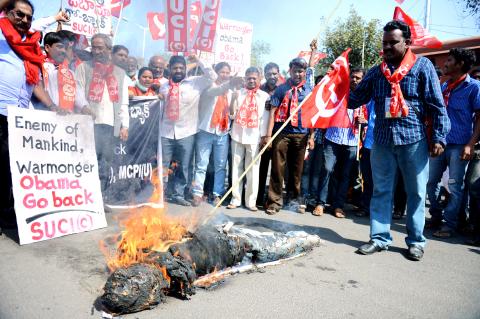
Photo: AFP
After some internal deliberations, the White House accepted Modi’s offer.
The visit also includes a fresh round of bilateral meetings with the prime minister, an economic summit with US and Indian business leaders.
Obama is to be the first US president to visit India twice while in office; he also traveled there in 2010 for an economic summit. First lady Michelle Obama was expected to be with the president when he arrived in New Delhi today.
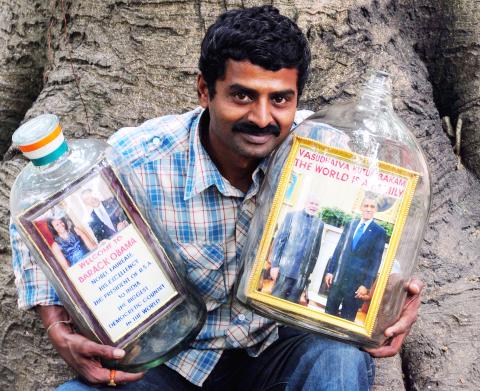
Photo: EPA
The president’s visit is expected to be heavy on symbolism and lighter on substantive advances, although climate change, economics and defense ties are all on the agenda, sources said.
Indian political commentator Ashok Malik said that expectations for concrete deliverables during the visit are “below the standards usually set by US presidents when they travel across the world for a three-day visit.”
Still, US and Indian officials appear to agree that even a symbolic show of solidarity between the leaders would be a sign of progress, after recent difficulties.
While military cooperation and US defense sales have grown, Washington has been frustrated by India’s failure to open up to more foreign investment and to address complaints alleging intellectual property violations.
India’s liability legislation has also prevented US companies from capitalizing on a landmark civil nuclear agreement between the two nations in 2008.
Relations hit a new low in 2013, when then-Indian deputy consul general Devyani Khobragade was arrested and strip-searched in New York over allegations that she lied on US visa forms to bring her maid to the nation, allegdly while paying the woman a pittance.
Khobragade’s treatment caused outrage in New Delhi, and India retaliated against US diplomats.
For Modi, hosting Obama at the Republic Day parade caps off a year of high-profile diplomatic maneuvers by a leader who was once shunned by the international community. He was denied a US visa in 2005, three years after religious riots killed more than 1,000 Muslims in the Indian state where he was the top elected official.
The visit ties in neatly with Modi’s election promise that he would turn around Asia’s No. 3 economy. And it could send a message to Pakistan and China — India’s closest neighbors and rivals — that Modi has a powerful ally in the US.
“Modi has used the invitation as a way of signaling that the United States really looms large in his calculations for where he want to take India,” Carnegie Endowment for International Peace senior associate Ashley Tellis said from Washington.
US officials say they hope that the improving relationship between Obama and Modi will have payoffs in the policy arena. The White House plans to push India on climate change, particularly after reaching a sweeping agreement with China on limiting carbon emissions.
Obama is also to be accompanied on his trip by several US business leaders hoping to forge new partnerships with India.
Obama has canceled the end of his trip to fly to Saudi Arabia next week in the wake of the death of its late ruler, a top Indian official said yesterday.
Obama is set to fly from India on Tuesday, skipping a planned trip that day to the Taj Mahal, the official said, speaking on condition of anonymity because he was not authorized to speak to reporters.
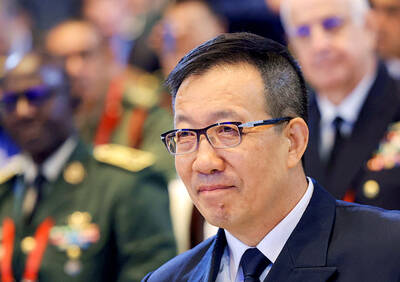
BEIJING FORUM: ‘So-called freedom of navigation advocated by certain countries outside the region challenges the norms of international relations,’ the minister said Chinese Minister of National Defense Dong Jun (董軍) yesterday denounced “hegemonic logic and acts of bullying” during remarks at a Beijing forum that were full of thinly veiled references to the US. Organizers said that about 1,800 representatives from 100 countries, including political, military and academic leaders, were in Beijing for the Xiangshan Forum. The three-day event comes as China presents itself as a mediator of fraught global issues including the wars in Ukraine and Gaza. Addressing attendees at the opening ceremony, Dong warned of “new threats and challenges” now facing world peace. “While the themes of the times — peace and development —
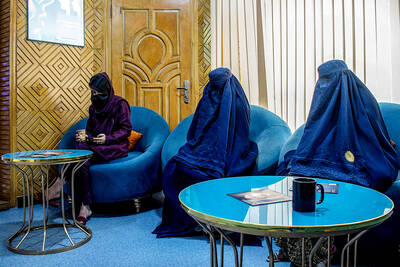
Decked out with fake crystal chandeliers and velvet sofas, cosmetic surgery clinics in Afghanistan’s capital are a world away from the austerity of Taliban rule, where Botox, lip filler and hair transplants reign. Despite the Taliban authorities’ strict theocratic rule, and prevailing conservatism and poverty in Afghanistan, the 20 or so clinics in Kabul have flourished since the end of decades of war in the country. Foreign doctors, especially from Turkey, travel to Kabul to train Afghans, who equally undertake internships in Istanbul, while equipment is imported from Asia or Europe. In the waiting rooms, the clientele is often well-off and includes men
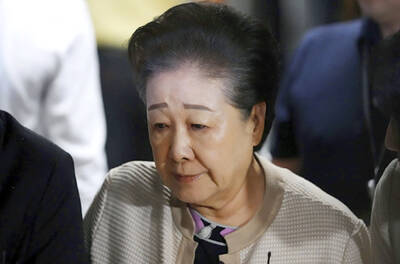
BRIBERY ALLEGATIONS: A prosecutor said they considered the risk of Hak-ja Han tampering with evidence to be very high, which led them to seek the warrant South Korean prosecutors yesterday requested an arrest warrant for the leader of the Unification Church, Hak-ja Han, on allegations of bribery linked to the country’s former first lady and incitement to destroy evidence. The move came a day after the 82-year-old was questioned over her alleged role in bribing former first lady Kim Keon-hee and a lawmaker. Founded in 1954 by her late husband, Sun Myung Moon, the Unification Church has long been the subject of controversy and criticism, with its teachings centered on Moon’s role as the “second coming” and its mass weddings. Followers are derisively referred to as “Moonies.” However, the church’s
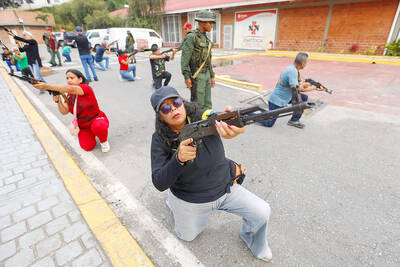
Venezuela on Saturday organized a day of military training for civilians in response to the US deployment in the Caribbean, and amid new threats from US President Donald Trump. About a month ago, Washington deployed warships to international waters off Venezuela’s coast, backed by F-35 jets sent to Puerto Rico in what it calls an anti-drug and anti-terrorism operation. Venezuelan Minister of Defense Vladimir Padrino Lopez has accused Washington of waging “undeclared war” in the Caribbean, after US strikes killed over a dozen alleged drug traffickers off his country’s coast. Caracas also accused the US of seeking regime change, and